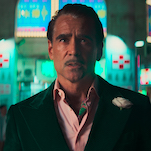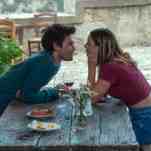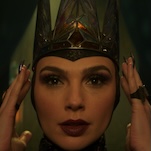Riverdale redefined "endgame" in its series finale
Riverdale delivered a funny, emotional, meta finale to conclude one of the wildest teen soaps television's ever seen

Whoever said you can’t have your cake and eat it too could not have imagined the magnificent power of Riverdale. The amount of ground this show had covered before the final season was already staggering: there was the bear attack and the organ harvesting cult and the Uncut Gems homage and the real estate scheme and the jingle jangle crisis and the supernatural superpowers plot and a half-dozen or so serial killers. The seventh season reset everything by sending the gang back to the 1950s, keeping the show’s lovable zaniness intact while also grounding it back in high school. Tying all of that up in a bow was a tall order for the series finale, but of course Riverdale did it in the most Riverdale way possible, honoring the show’s “endgame” romances while still managing to blaze its own completely original path forward.
The series was, of course, obsessed with its own “endgame,” playfully winking at fandom shipping culture as it mixed and matched the cast in sometimes odd but usually compelling combinations. Archie’s mom (Molly Ringwald) was on record that he and Veronica (Camila Mendes) were endgame; Riverdale’s time-traveling guardian angel Tabitha (Erinn Westbrook) told Veronica there were equal chances he’d end up with her or Betty (Lili Reinhart). The final season shook everything up, flirting with a lot of fun possibilities: Betty and Archie (KJ Apa); Ronnie and Reggie (Charles Melton); Betty and Reggie; Ronnie and Jughead (Cole Sprouse); Ronnie and Betty; even Archie and Reggie. (Choni, the portmanteau for the couple played by Madelaine Petsch and Vanessa Morgan, made it all the way to the end, as the witch in season six foretold.)
But why choose just one combination when you can have them all? The finale revelation that rocked the Internet is that Archie, Betty, Veronica, and Jughead spent the entirety of their senior year in a four-way romantic relationship. It’s a bone thrown at fans of the series’ OG couples (affectionately called Varchie and Bughead) while also honoring the show’s campy roots (and the queer sensibility that ramped up even further in the final season). It solidified the bond shared by the “core four” main characters—and yet it ultimately circumvented the “endgame” altogether, sending the characters in separate directions after graduation. Archie became a construction worker in California, Veronica a studio executive, Jughead created their universe’s MAD Magazine, and Betty became their universe’s Gloria Steinem.







































